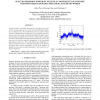Free Online Productivity Tools
i2Speak
i2Symbol
i2OCR
iTex2Img
iWeb2Print
iWeb2Shot
i2Type
iPdf2Split
iPdf2Merge
i2Bopomofo
i2Arabic
i2Style
i2Image
i2PDF
iLatex2Rtf
Sci2ools
108
click to vote
CISS
2008
IEEE
2008
IEEE
Sum transmission power of multiple cooperative secondary transmitters in dynamic spectrum access networks
Cognitive radio is a desirable technique for secondary users to utilize the spectrum gray space. In order to avoid intolerable interference to primary users, the transmission power of cognitive radios must be carefully managed. In this paper, we analyze the sum transmission power of a group of randomly distributed but fully cooperated secondary transmitters in a network consisting of one primary transmitter and multiple randomly distributed primary receivers. The sum power is given by numerical integrations, or by closed-form approximate expressions. The results indicate that significant secondary transmission power is allowable, depending on the distance of primary and secondary transmitters, as well as the numbers of primary receivers and secondary transmitters. Such results are verified in simulations.
CISS 2008 | Cognitive Radios | Information Management | Secondary Transmitters | Transmission Power |
Related Content
| Added | 29 May 2010 |
| Updated | 29 May 2010 |
| Type | Conference |
| Year | 2008 |
| Where | CISS |
| Authors | Juite Hwu, Jinying Chen, Xiaohua Li |
Comments (0)

